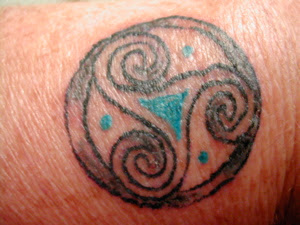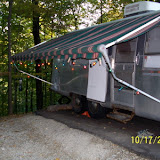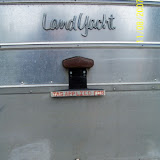
Spiritual DNA, or, The Day the Imam met the Southern Belle
Anne G. McWilliams and Michael “Mikal” Saahir
Sunday, March 8, 2009
First Congregational United Church of Christ
Indianapolis, Indiana
Today was an extraordinary day. True to the promise of the first covenant, G-d made Abraham a blessing in this place.
As I drove into the church parking lot, I saw a very tall, physically large man of dark complexion walking away from his car toward the back door of the church. He was wearing a handsome brown business suit and on his head was a cap that I thought was typical of Muslim men. A petite woman, also of dark complexion, followed soon after from the same car. She wore dark slacks and a pretty blouse, and she was drawing a colorful scarf around her hair and her shoulders.
I gathered my permanent name-tag from the rack in the foyer and moved downstairs to the big room where we have the early service. I walked past the Imam who was speaking with the pastor, Dick Clough. I went to my seat to review the new list of monthly events on the calendar that had been handed to me when I arrived in the room.
On the calendar was a little blurb about the Imam. When Dick introduced him, I learned that he was the Imam at Nur-Allah Mosque for many years, and he was involved in a variety of service works in the community. Dick said he was a bridge-builder, not a wall-builder. My curiosity grew. I wondered if he would be from another country or if he would be an American? I considered how many Muslims I actually know; known well, none; acquaintances, a few; what's my point of reference? Mostly Middle Eastern and African, maybe African American. What kinds of hints are bringing these associations to mind? A name? A culture? An ethnicity?
The service, true to its non-traditional order and style, proceeded in its typical multi-sensory fashion. A YouTube film told the story in cartoon drawings of Jesus in the wilderness. We sang songs of a mixture of genres, accompanied by an electric piano and a trap set. A woman and a man presented a skit that was prepared for this day.
The skit presented the spiritual DNA of the three major Abrahamic faiths, using comedy, relying on the prop of a laptop computer; delivering factual content that could have been derived from Google and Wikipedia. The skit drew an ever-widening circle from the smaller derivative Christian denominations, to the historic mainline churches, to the globally recognized predecessors of Judaism and Islam, arriving at the one that linked them all: Father Abraham -- our common source of spiritual DNA.
All of the symbolisms of DNA, family trees, and genetics captured the generous spirit of inclusion that would hold our thoughts throughout the day. In my church, it's practically a requirement to be willing to stand side by side with people of very strong Trinitarian commitment, with those who hold a moderate Christology, and with those who are frankly Universalist. This wideness is one of the inclusions of our community, and one of the things I was looking for when I ended my search for a church home here.
Once the Imam, Mikal Saahir, began to speak, I recognized that he was fully an American, an African American, who came to Islam as a young man through the influence of the American movement of the Nation of Islam. His voice was quiet. I must have been expecting a booming voice to emerge from a tall and big man. His demeanor projected a calm, humor-streaked, gentle, self-effacing authority.
Mikal’s presentation in the first service was brief, promising to go into more detail with questions and discussions during the Sunday School hour after the early service. Following this promise, the early service followed its patterns of songs, conversational and casual comforts, prayers, and exhortations. We formed a large circle around the room for the benediction, then broke for coffee and pastries and fruit.
Several people approached the Imam, but I approached his wife, Carolyn, to introduce myself to her. We began to exchange names. Mikal turned to me, shook my hand, and read my name-tag. In the murmurs of conversation swirling around us, I thought I heard him say something about knowing another McWilliams. (There is another Ann McWilliams, no e, in Indianapolis, a great R&B singer-songwriter.)
After completing a couple more sentences with Carolyn and others who had joined us, I turned back to Mikal and said, “What did you say about someone else ‘McWilliams’?”
He repeated, “I have a relative named Anne McWilliams.”
“Here in Indianapolis?” I asked.
“No, not here, in Alabama. She passed away some years ago,” he replied.
“Alabama? I’m from Alabama.” I am aware this is not always obvious or audible to people, because I tend to adapt my accent to my location.
“What part of Alabama are you from?”
“Athens. It’s about a hundred miles …” I began to locate the town of 18,000 souls almost equally between Nashville and Birmingham, on I-65. But, there was no need.
“I know exactly where Athens is. My parents are from Athens.”
Combining all of the places I have lived and visited, I could count on three fingers the number of people I have met from Athens. I did the cartoon double-take: Athens? Are you saying, Athens? Meanwhile, Mikal, who knows my home town, is clarifying his statement:
“Actually, my mother is from Elkmont.”
When my brain, not yet recovered from Athens tries then to take in the name, Elkmont, I am off balance and unprepared.
“Did you say Elkmont?” I ask, again with the double-take. “My father was born in Elkmont.”
“My ancestor, George McWilliams, was freed from slavery at the age of nine by his owner, a McWilliams, in Elkmont. The owner’s name was LaFayette McWilliams, but they called him ‘Fate’.” Mikal is delivering this information thoughtfully, slowly, perhaps also trying to get his balance about this unfolding story, this very unlikely encounter, this revelation.
“Jim Fate McWilliams,” I interrupted him. I know this name from a genealogy I received long ago. James LaFayette McWilliams (LaFAY-t, Fate) But, I can’t place him in his generation, I just know the name.
“Fate McWilliams freed my great grandfather when he was nine years old. And, he had a son, and a daughter, Mary McWilliams …” he continued.
“…Gilbert. Mary McWilliams Gilbert. My father’s aunt. I met her when I was in college. Her brother was my grandfather, but I never knew him.”
I feel weak in the knees as I realize, Fate McWilliams, my great grandfather, was a slave-owner. This is news to me. I began to perspire, I feared I would faint. How Southern Belle, to faint – Anne, don’t faint.
Somehow, I stayed on my feet. This news devastated my white liberal sensibilities, my struggle with internalized racism. Mikal delivered my history to me in a tone that matched mine, of amazement, of unfolding realization of our connection, our ties to place and home, our shared history. Has it been just four generations since the Civil War, Emancipation, and Reconstruction? But, the conversation is running on ahead of me, and my mind shifts to a closer past as I think about my father’s aunt.
My father took us to meet his Aunt Mary in 1979, when she called to tell us that my father’s father had died and had left him a small bequest. I was anticipating graduation from college and going to Bolivia for six weeks before entering seminary.
Mary McWilliams Gilbert’s husband was Van Buren Gilbert, whom I never met. He was the county sheriff, and eventually was appointed to head the Alabama State Patrol. He worked for the likes of Theophilus Eugene “Bull” Connor and George C. Wallace, governors during the Johnson administration and into the 70s and desegregation of our state’s public schools and colleges, among other upheavals of the Civil Rights Era.
I said, “Mary McWilliams and Van Buren Gilbert had two sons. One passed away when I was a child, but one still lives in Athens, Thomas Martin Gilbert.”
Mikal agreed that he knew this, and added, “I have a photograph of my great grandfather George McWilliams holding Thomas Martin Gilbert when he was just a baby.”
Thinking of my father, I said, “I would love to see that picture. I’m sure my father would love to see it, too.”
“I have it at home, a digital copy, I can send it to you.”
“I would love that,” I replied, thinking about Thomas Martin Gilbert, my father’s first cousin, a man I met thirty years ago, yet only had seen once since, at my mother’s funeral in 2001. I think of him as my coach into a life of travel and adventure. I suddenly feel that I want to visit him, talk with him. I suddenly realize what a distantly orbiting satellite I have been to my family in Athens.
Mikal very tenderly reported, “Mary Gilbert named my mother.” To my ears, this was both a beautiful gesture and a troubling one. I heard this news with tears forming behind my eyes.
Later, Mikal continued to explain this legacy to me:
“From what I understand, Mamie McWilliams lived in the house of her father George. George’s house was very close (just north) to where Mary Gilbert last lived in Elkmont. Mamie married William Edward Brown and from this union 15 children were born, one of whom was my mother Gloria, born in 1933. My mother married my father Oliver Flanagan who lived in Athens. They moved to Indianapolis in the early 1950s as part of the great migration of many African Americans who left the south seeking employment and education in the north. Nonetheless, apparently my grandmother Mamie (McWilliams) Brown and your great aunt Mary (McWilliams) Gilbert were close associates – close enough to suggest and have fulfilled naming my mother the beautiful name of Gloria.”
The name Gloria continues in Mikal’s family. His brother Thomas named his daughter Gloria who in turn also named her daughter Gloria. In our ongoing conversation, Mikal clarifies the meaning of this naming: “Thanks to your great aunt, the name Gloria (which means Glory – praise, honor, thanksgiving) continues to be a part of my family.”
Dick Clough provided a pen and paper and Mikal and I sketched out the generations of our two families, side by side:
- his great-grandfather, George McWilliams, freed from slavery at age nine by
- James LaFayette “Jim Fate” or “Fate” McWilliams, my great grandfather;
- his grandmother Mamie McWilliams Brown, and her contemporaries,
- my grandfather, Robert Lee (“Bob Lee”) McWilliams and his sister, Mary (McWilliams) Gilbert;
- his mother, Gloria Brown Flanagan, named as an infant by Mary Gilbert, and her contemporary,
- my father, Robert Lee (“Bob Jr.”) McWilliams;
- finally, for this day’s telling, our generation, Michael Flanagan (52) who became Michael “Mikal” Saahir, and
- my brothers’ and me (51). Robert Lee McWilliams, III (born 1960, died at age 44 in 2005); Patrick Butler McWilliams, born in 1963; and me, Anne Grace McWilliams, born in 1957.
We continued on to the Q&A upstairs in the library. I arrived in the room to find Mikal and Dick relating this story to the group gathered there. I sat down, continuing to feel quite stunned by this discovery of connection. When I left my house that morning, I was groggy from the time change and still re-entering from a vacation to Mexico. Now, I was buzzing with excitement, but also thrown for an existential and theological loop.
Long ago, I moved away from my evangelical certainties and developed a very stubborn non-interventionist streak when it comes to G-d’s work on the personal level. I have not had a very good history with the personal G-d of the ICU or of the parking space. But, I do know that something or someone holds me within some kind of orbit around the G-d of my environment and my people. Let’s just leave it at that.
Now, however, I feel that I am being visited by Providence. Or Something. I said to Carolyn Saahir, “This feels like a divine appointment.”
As we continued on through the morning, into the 11:00 service, Dick called Mikal and me up to the front of the church during the children’s moments. He had been talking with the kids about this G-d of Abraham, and this Abraham of the Jews, the Christians, and the Muslims. Same G-d, same spiritual DNA.

Dick invited Mikal and me to recreate our conversation down in the coffee time earlier in the morning. I was near tears. People in the congregation were transfixed. We closed our testimony addressing each other, “Cousin,” and a handshake that became a hearty hug.
After the second service, we continued to gather scraps of information. Among many other details, Mikal told me that he felt impressed to go and visit with my father’s Aunt Mary in 1984, just 5 years after I met her for the first time. He had a long conversation with my great-aunt, the person who named his mother Gloria. I wish I could have been a fly on the wall!
Yes, today was a most extraordinary day. Today, the Imam came to our church. The G-d of Abraham was present in our wide circle of inclusion. I found a wider love and a deeper grace. Into my constantly expanding sense of family, I found a cousin, most likely not of flesh and blood, nor only of geography and place, but a DNA of Spirit that extends back as far as Father Abraham.
Assalamu alaikum ~~~ Shalom ~~~ Peace
 Photo Details: George McWilliams (b. February 1854 – d. June 30, 1938) holding Thomas Martin Gilbert (b. 192?), Elkmont, Alabama. Contributed by Mikal Saahir from family archives.
Photo Details: George McWilliams (b. February 1854 – d. June 30, 1938) holding Thomas Martin Gilbert (b. 192?), Elkmont, Alabama. Contributed by Mikal Saahir from family archives.The Emancipation Proclamation was extended to the Tennessee Valley of northern Alabama on January 1, 1863.
In what year was this photo taken? 192?
In what year was Thomas Martin Gilbert born?
George McWilliams (b. February 1854 – d. June 30, 1938). Born into the Yarbrough family, along with two brothers. George and one of his brothers were purchased by James LaFayette McWilliams. George was freed from slavery (along with his brother?) in 1863 at the age of nine.
If : Thomas Martin Gilbert was born in 1923 (estimating: he is older than my Dad who was born on October 9, 1929, in Elkmont; TM looks to be about 18 mos.); and,
If : George McWilliams was nine years old in 1863, when Jim Fate McWilliams was required to give him his freedom (he was!); and,
If : this photo was taken in 1925;
Then : In this photo, if it was taken in 1925, George McWilliams might be around the age of 69, Thomas Martin about 18 months.

 back in the day, August 8, 2008.
back in the day, August 8, 2008. 


